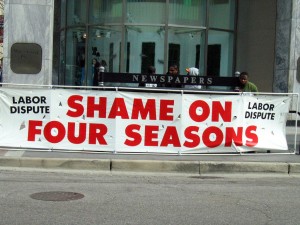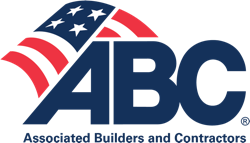Union bannering campaigns attempt to punish local businesses for using contractors whose employees choose not to join a labor organization.
To succeed, union bannering campaigns often rely on misinformation. These efforts are most effective when construction project owners and the general public do not ask the vital follow-up questions about the union’s claims.
Below are some common-sense first steps for project owners and contractors to take when confronting a union bannering campaign.
For Developers and construction project owners:
- Learn more from your contractor. Contractors are frequently targets of union-sponsored misinformation campaigns. Learn the facts before you accept the union’s claims. Ask your contractor about its wage and benefit packages. Find out why Big Labor is really holding an intimidating banner outside your business.
- Understand what bannering really means. Bannering rarely, if ever, results in work stoppages or project delays. Most merit shop contractors have the tools to keep projects on time and on budget despite union attempts to cause distractions or delays. Contractors are selected to perform work because they can deliver quality, cost-effective construction. Union bannering does not change these underlying facts.
- Discuss a strategy for reacting with your contractor. There is no perfect reaction to union bannering; the best response usually depends on individual circumstances. In some instances, not responding is the best course of action. In other situations, local media and other businesses in the community can be strong allies in the effort to debunk misleading propaganda. There also may be legal options for stopping the union bannering campaign.
- Contact Associated Builders and Contractors. The threat of a union bannering campaign can be daunting and the facts can be unclear. We can help. Contact Associated Builders and Contractors to learn more about how union bannering hurts you and your community.
For contractors:
- Verify that union claims are inaccurate and prepare evidence. Most bannering campaigns claim a contractor is not paying area standard wages (i.e., union-scale wages). Many contractors can demonstrate that they pay workers fair wages and other benefits. The contractor must be able to show evidence of that fact if asked to do so.
- Determine how comfortable the project owner and/or project manager (general contractor) is with exposing Big Labor’s intent through the media. Project owners and higher tier contractors need to be aware of and comfortable with the targeted contractor’s outreach strategy. Media outreach will likely put the companies in the spotlight in hopes of exposing the union’s mischaracterizations. While media attention frequently yields positive results for the contractors, this outcome is not guaranteed.
- Contact the local ABC chapter. ABC chapters are connected to a national network of best practices and other resources. Many ABC chapters also have staff members who are experienced in coordinating media and community outreach campaigns. Chapter resources can help ensure merit shop contractors know their legal rights and execute efficient and effective campaigns.
- Prepare media packets and other necessary materials in advance. It can be helpful for targeted contractors to prepare media packets in advance, which enables the contractor to respond quickly to media inquiries. These packets should include a summary of events, the contractor’s side of the story and other relevant information in an easily accessible format.
- Save copies of all media hits.
- Contact Associated Builders and Contractors. Associated Builders and Contractors has a Bannering Resource Guide to assist members with confronting bannering campaigns. Contact ABC National or your local ABC chapter for more information.



